|
|
|
Sort Order |
|
|
|
Items / Page
|
|
|
|
|
|
|
| Srl | Item |
| 1 |
ID:
095295
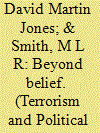

|
|
|
|
|
| Publication |
2010.
|
| Summary/Abstract |
The development of radical Islamist strategic thinking and the impact of post-modern, Western styles of thought upon the ideology that informs that strategy is often overlooked in conventional discussions of homegrown threats from jihadist militants. The propensity to discount the ideology informing both al-Qaeda and nominally non-violent Islamist movements with an analogous political philosophy like Hizb ut-Tahrir neglects the influence that critical Western modes of thought exercise upon their strategic thinking especially in the context of homegrown radicalization. Drawing selectively on non-liberal tendencies in the Western ideological canon has, in fact, endowed Khilaafaism (caliphism) with both a distinctive theoretical style and strategic practice. In particular, it derives intellectual sustenance from a post-Marxist Frankfurt School of critical thinking that in combination with an "English" School of international relations idealism holds that epistemological claims are socially determined, subjective, and serve the interests of dominant power relations. This critical, normative, and constructivist approach to international relations seeks not only to explain the historical emergence of the global order, but also to transcend it. This transformative agenda bears comparison with radical Islamist critiques of Western ontology and is of interest to Islamism's political and strategic thinking. In this regard, the relativist and critical approaches that have come to dominate the academic social sciences since the 1990s not only reflect a loss of faith in Western values in a way that undermines the prospects for a liberal and pluralist polity, but also, through a critical process facilitated by much international relations orthodoxy, promotes the strategic and ideological agenda of radical Islam. It is this curious strategic and ideological evolution that this paper explores.
|
|
|
|
|
|
|
|
|
|
|
|
|
|
|
|
| 2 |
ID:
095290
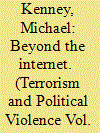

|
|
|
|
|
| Publication |
2010.
|
| Summary/Abstract |
This study challenges the conventional wisdom that the Internet is a reliable source of operational knowledge for terrorists, allowing them to train for terrorist attacks without access to real-world training camps and practical experience. The article distinguishes between abstract technical knowledge (what the Greeks called techne) and practical, experiential knowledge (mtis), investigating how each helps terrorists prepare for attacks. This distinction offers insight into how terrorists acquire the practical know-how they need to perform their activities as opposed to abstract know-what contained in bomb-making manuals. It also underscores the Internet's limitations as a source of operational knowledge for terrorists. While the Internet allows militants to share substantial techne, along with religious and ideological information, it is not particularly useful for disseminating the experiential and situational knowledge terrorists use to engage in acts of political violence. One likely reason why Al Qaeda and other Islamist terrorists have not made better use of the Internet's training potential to date is that its value as a source of operational knowledge of terrorism is limited.
|
|
|
|
|
|
|
|
|
|
|
|
|
|
|
|
| 3 |
ID:
095298
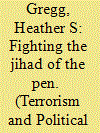

|
|
|
|
|
| Publication |
2010.
|
| Summary/Abstract |
Al Qaeda's ideology is not new; their critique of the existing political and social order and vision for how to redeem the Muslim world builds on preexisting arguments of several 20th century predecessors who called for an Islamic revolution that would create a new order based on Islam. The persistence of revolutionary Islam suggests that these ideas need to be countered in order to strike at the root of the problem driving Islamically motivated terrorism and insurgency. U.S. efforts to defeat Al Qaeda, however, continue to focus primarily on killing or capturing the leadership, interdicting operations, and defensively bolstering the homeland and U.S. assets against various types of attacks. In order to confront Al Qaeda's ideology, U.S. efforts should focus on indirectly fostering "a market place of ideas"-the space and culture of questioning and debating-in order to challenge the grievances and solutions proposed by revolutionary Islam.
|
|
|
|
|
|
|
|
|
|
|
|
|
|
|
|
| 4 |
ID:
095289
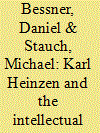

|
|
|
|
|
| Publication |
2010.
|
| Summary/Abstract |
Scholars have long recognized the importance of Karl Heinzen's Mord und Freiheit in the history of terrorist thought. Yet the translation most scholars have relied on-1881s Murder and Liberty-is incomplete. Our new translation reveals four elements omitted from the 1881 translation. First, Heinzen conceived of terrorism as a transnational phenomenon. Second, he provided a material justification for terrorist tactics. Third, Heinzen viewed terrorism as both a tool to impel human society to progress and as a "progressive" tool of violence. Finally, he argued in favor of the primary modern tactic of terrorism-the indiscriminate bombing of civilians.
|
|
|
|
|
|
|
|
|
|
|
|
|
|
|
|
| 5 |
ID:
095291


|
|
|
|
|
| Publication |
2010.
|
| Summary/Abstract |
During the late 1970s, Turkey experienced a major campaign of political terrorism that was waged by a multiplicity of leftist, ultranationalist, and separatist groups. Between 1976 and 1980, more than 5000 people lost their lives in hundreds of terrorist incidents. The steady escalation of violence amidst a major political and economic crisis undermined the country's fragile democratic system and paved the way for a military coup in September 1980. This study examines the origins and growth of the terrorist movement in Turkey, the main characteristics of political violence, and the causes of the dramatic escalation of terrorism in the late 1970s. The study suggests that although state-sponsored terrorism against Turkey facilitated the rapid proliferation of leftist, rightist, and separatist armed extremist groups, the drift into total terrorism was largely the product of domestic political and social developments.
|
|
|
|
|
|
|
|
|
|
|
|
|
|
|
|
| 6 |
ID:
095296
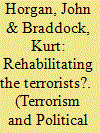

|
|
|
|
|
| Publication |
2010.
|
| Summary/Abstract |
Renewed interest on how and why terrorism ends has emerged in parallel with increased visibility of some new and innovative approaches to counterterrorism. These are collectively known, whether for good or bad, as "de-radicalization programs." However, and despite their popularity, data surrounding even the most basic of facts about these programs remains limited. This article presents an overview of the results of a one-year pilot study of select de-radicalization programs and investigates critical issues surrounding assessment of their effectiveness and outcomes. We argue that Multi Attribute Utility Technology (MAUT) may offer promise for future empirical assessment of what we prefer to designate "terrorism risk reduction initiatives." Perhaps less obviously, and until more data surrounding the efficacy of such initiatives becomes available, MAUT may also provide a conceptual basis for planning, evaluating, and guiding the development of future such initiatives and may have the unanticipated consequence of facilitating progress by encouraging greater exploration of efforts to change behavior from other contexts.
|
|
|
|
|
|
|
|
|
|
|
|
|
|
|
|
| 7 |
ID:
095293
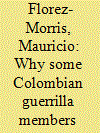

|
|
|
|
|
| Publication |
2010.
|
| Summary/Abstract |
Based on 42 in-depth interviews with members of three former Colombian guerrilla organizations, M-19, EPL, and CRS, reasons why they stayed in these organizations through several years, if not decades, of violent confrontation with government forces are examined. From a micro-level perspective, the study identifies four important motivations for members to remain in these groups: personal dependence on their organization, values shared with other members and with the group, the clandestine life-style, and self-identity, which is boosted by the subjects' feeling that their work in the group matters.
|
|
|
|
|
|
|
|
|
|
|
|
|
|
|
|
|
|
|
|
|